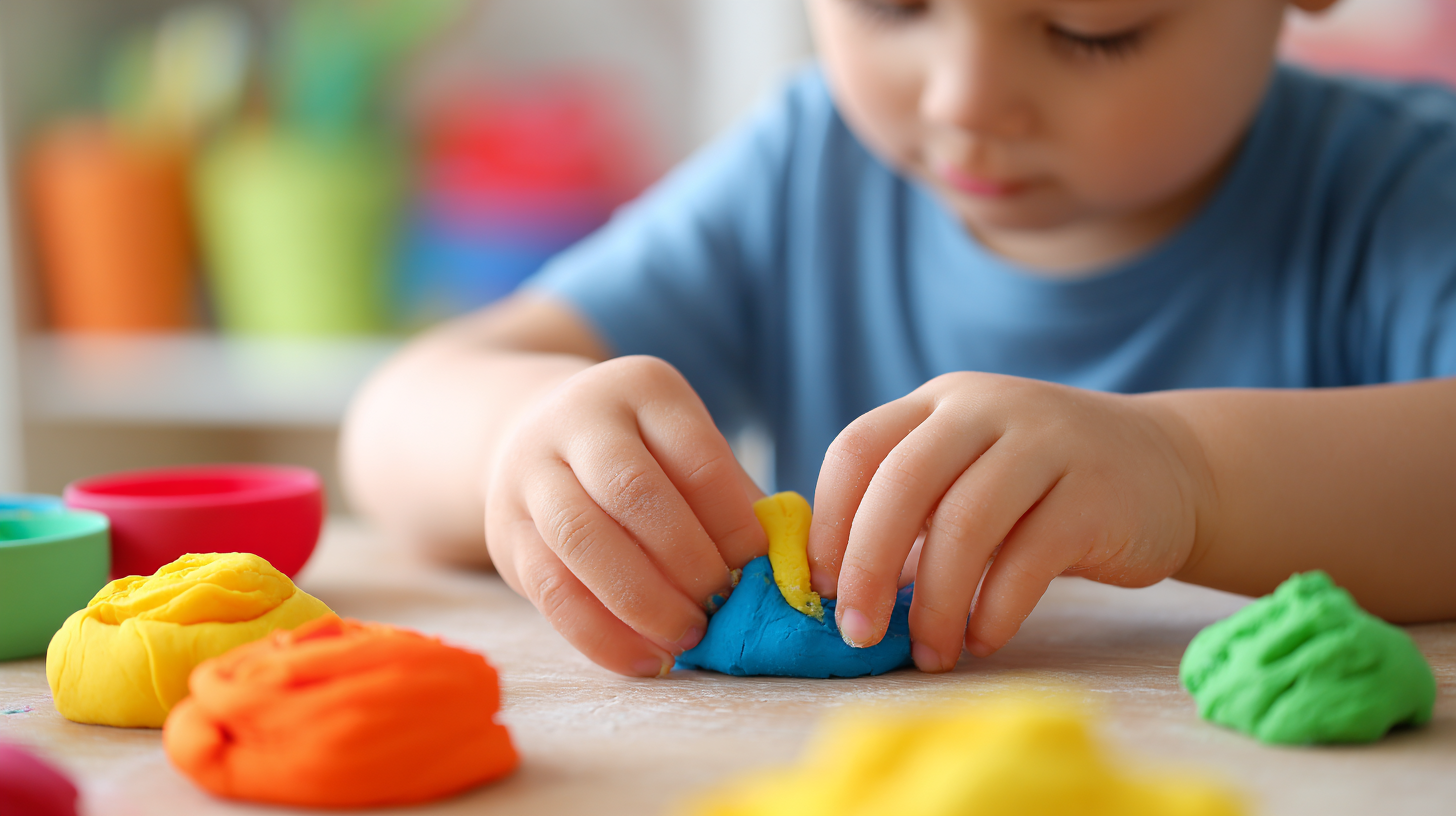 Play dough has emerged as an indispensable tool in early childhood education, fostering creativity and supporting various facets of child development. According to the American Academy of Pediatrics, the first five years of a child's life are critical for cognitive, emotional, and social growth. During this period, hands-on activities like play dough offer a unique opportunity for children to enhance fine motor skills and sensory experiences, which are essential for their overall development. Research has shown that engaging in tactile activities can significantly improve children's hand-eye coordination and dexterity, laying a foundation for later academic success.
Play dough has emerged as an indispensable tool in early childhood education, fostering creativity and supporting various facets of child development. According to the American Academy of Pediatrics, the first five years of a child's life are critical for cognitive, emotional, and social growth. During this period, hands-on activities like play dough offer a unique opportunity for children to enhance fine motor skills and sensory experiences, which are essential for their overall development. Research has shown that engaging in tactile activities can significantly improve children's hand-eye coordination and dexterity, laying a foundation for later academic success.
Additionally, play dough encourages imaginative play and social interaction among peers. A study published in the Journal of Child Development revealed that children who regularly engage in creative play are more likely to develop problem-solving skills and emotional intelligence. By molding and shaping play dough, children not only express their creativity but also learn to collaborate, negotiate roles, and share resources with others. These social dynamics foster a sense of community and belonging, which are vital for emotional well-being.
In conclusion, incorporating play dough into early childhood activities is not merely about fun; it’s a strategic approach to holistic child development. With its myriad benefits ranging from improved fine motor skills to enhanced creativity and social interaction, play dough stands out as a simple yet powerful tool for nurturing the next generation's growth and potential.
Play dough activities are a fantastic means of sensory stimulation, offering children the opportunity to engage their senses while fostering creativity. The tactile experience of molding and manipulating play dough allows children to explore different textures and resistances, which can enhance their fine motor skills. As they roll, flatten, and shape the dough, they develop hand-eye coordination and strengthen the muscles in their hands and fingers, essential for tasks such as writing and drawing later on.
Moreover, play dough is an excellent medium for imaginative play. Children can create a variety of shapes, objects, or scenes, prompting them to think creatively and make decisions about their designs. This process not only nurtures their artistic expression but also encourages problem-solving skills as they figure out how to bring their ideas to life. Through collaborative play with peers, children learn to communicate and negotiate, enhancing their social skills while also benefiting from the sensory input provided by the play dough environment. Overall, play dough serves as a versatile tool that combines sensory development with creative exploration in a fun and engaging way.
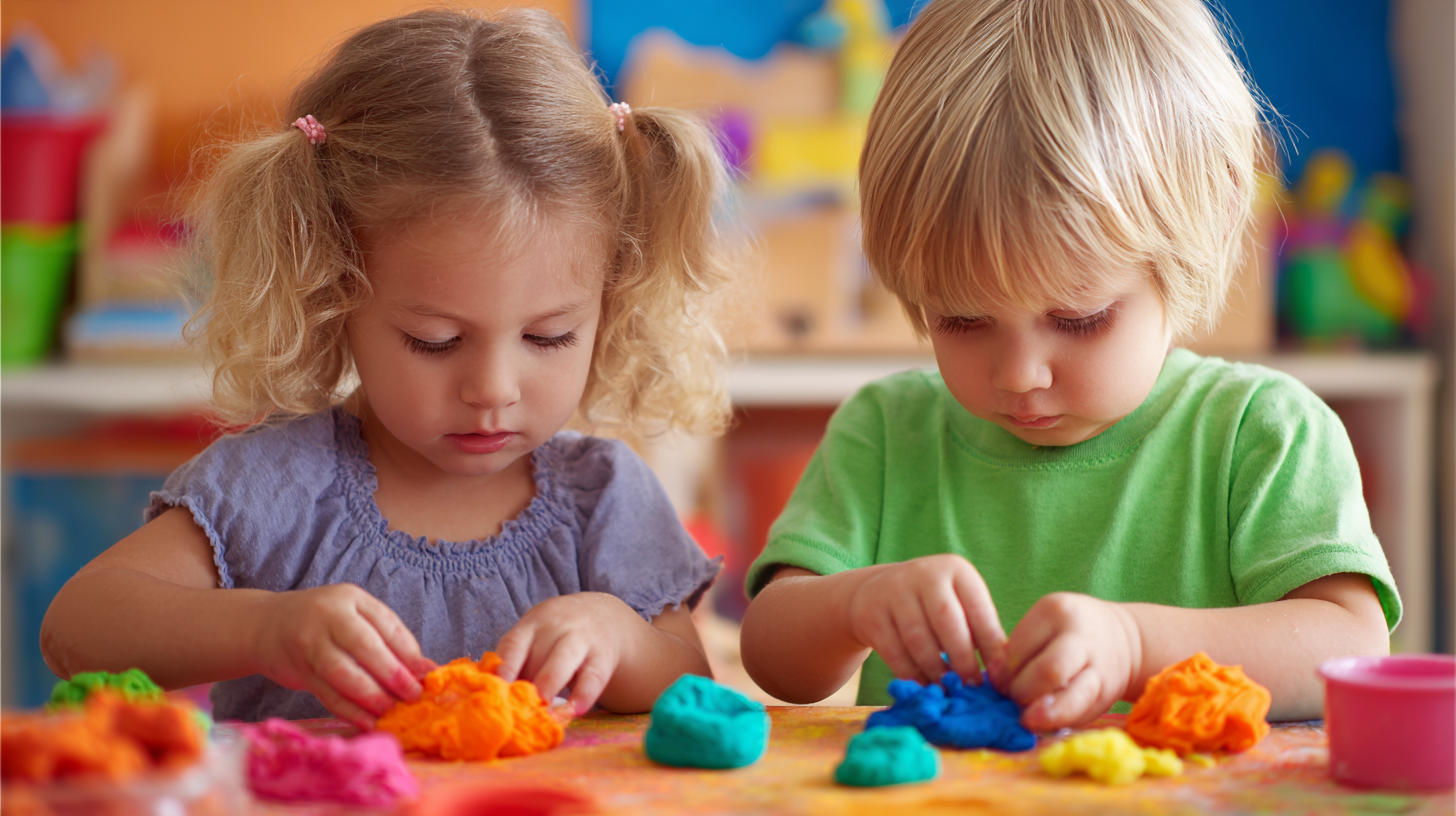
Play dough is a versatile and engaging tool that significantly enhances fine motor skills in young children. By squeezing, rolling, and pinching the dough, children develop the small muscles in their hands and fingers. These activities require precision and control, which are essential for tasks such as writing and buttoning clothes. As children manipulate the dough, they strengthen their hand-eye coordination and dexterity, setting a solid foundation for their future skills.
Moreover, the open-ended nature of play dough encourages creativity and imaginative play, further benefiting fine motor development. Children can create anything from intricate shapes to figures, allowing them to express themselves freely. This creative process not only fosters artistic expression but also enhances problem-solving skills as they figure out how to mold and reshape their dough creations. Engaging in play dough activities can provide a fun and effective way for children to develop important fine motor abilities while enjoying the freedom to explore their artistic sides.
Play dough is a versatile and engaging material that fosters imagination and creativity in young minds. As children manipulate and sculpt this malleable substance, they not only explore their artistic abilities but also enhance their fine motor skills. The colorful textures invite experimentation, allowing kids to express their emotions and ideas freely. This creative process promotes cognitive development, as children learn to problem-solve and think critically while creating their masterpieces.

Tips: Encourage children to use various tools while playing with dough, such as cookie cutters, rolling pins, and stamps. This can enhance their experience and introduce them to new shapes and textures. Additionally, set themes for play sessions, like animals or food, to stimulate their imagination and give them a sense of direction in their creations.
Moreover, play dough can also serve as a springboard for storytelling. As children create figures and scenes, they can weave narratives around their designs, expanding their language skills and understanding of story structures. By guiding conversations about their creations, parents and caregivers further nurture children's creativity and communication abilities.
Tips: Ask open-ended questions about what they’re making to spark discussion and encourage deeper thinking. For instance, inquire about the characters in their play dough world or what adventures they might embark on, fostering both creative expression and critical thinking.
Play dough not only serves as a delightful medium for creative expression, but it also plays a significant role in fostering social interaction and cooperative play among children. According to the American Association of Pediatrics, engaging in activities where children manipulate play dough can enhance their social skills by providing opportunities for collaboration and communication. When children work together to create shapes or structures, they learn to negotiate roles, share tools, and express their ideas, all of which are crucial elements of effective social interaction.
Moreover, a study published in the Journal of Child Development highlights that cooperative play, which often arises during play dough activities, can lead to improved emotional intelligence. Children learn empathy as they understand each other’s perspectives while working towards a common goal. Setting up play dough stations in group settings—like classrooms or playdates—can further promote this collaborative spirit.
**Tips:**
1. Create themed play dough activities that encourage children to work together, such as building a community or environment.
2. Introduce challenges or games that require teamwork, like racing to create the tallest structure while sharing tools and ideas.
3. Facilitate discussions about their creations, prompting kids to express their thoughts and feelings, thus enhancing their communication skills.
Play dough is more than just a colorful crafting material; it serves as a powerful tool for aiding emotional expression and regulation among children. Engaging with play dough allows children to manipulate and shape their feelings, which can be particularly beneficial for those who struggle with verbalizing emotions. According to a report by the American Academy of Pediatrics, play-based learning significantly enhances emotional skills, allowing children to process complex feelings and develop resilience in a supportive environment.
When children mold and create with play dough, they engage in sensory play, which has been linked to improved emotional regulation. A study published in the Journal of Child Psychology and Psychiatry found that sensory play activities can decrease anxiety and enhance a child's ability to manage their emotions. As children squish, roll, and flatten the dough, they engage not only their fine motor skills but also their brain's emotional circuits, promoting self-soothing behaviors and providing a constructive outlet for stress and frustration.
Furthermore, the repetitive motions involved in play dough manipulation can be therapeutic, providing a calming effect comparable to mindfulness practices. According to research by the National Institute for Play, incorporating tactile experiences like play dough into daily routines fosters emotional intelligence and helps children recognize and articulate their feelings more effectively. This creative engagement empowers children to explore their imagination while simultaneously nurturing their emotional development.

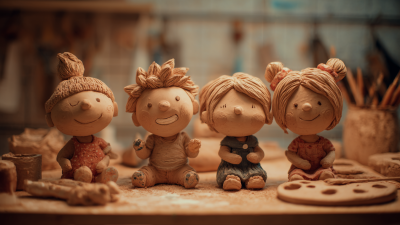
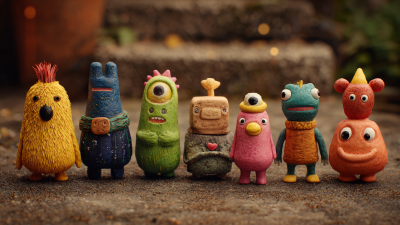
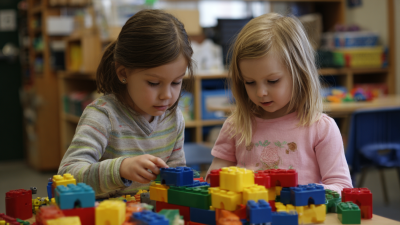


+86-754-86986185


David: info@yo-yo.net.cn
Susan: sales8@yo-yo.net.cn
Eunice: sales3@yo-yo.net.cn
Vincent: st88@sixtrees.cn


David: +86 13118683999
Susan: +86 13829657827
Eunice: +86 13809675407
Vincent: +86 13592830482
